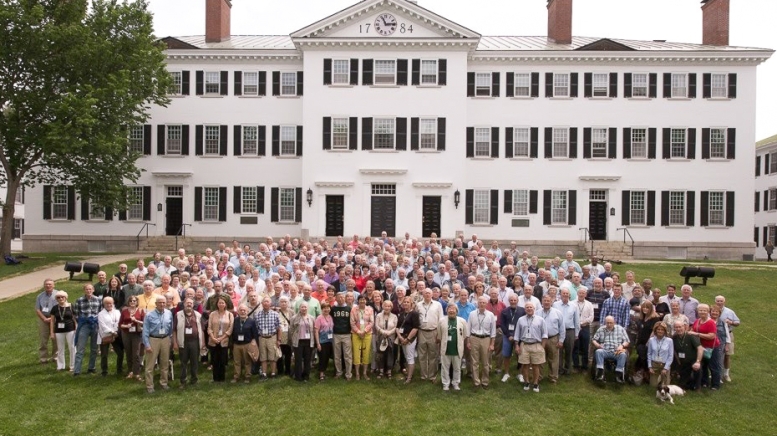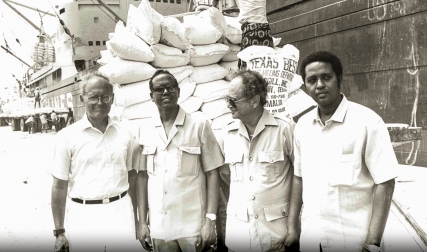As a member of the Class of 1968, I recently attended my 50th reunion. It was the first reunion I had gone to. Because I live on the west coast, attending previous such events had not been high on my priority list. But the 50th seemed special, and I decided to go. I am glad I did. Great conversations and powerful connections highlighted my experience back at Dartmouth. I would like to share a few reflections:
Year of Upheaval. My class graduated in one of the most tumultuous years in the nation’s history. Former Dartmouth President John Sloan Dickey said 1968 was “a year when events drove history.” Author John Hersey called it “The Year of the Trip-Hammer.” Wall Street Journal columnist Daniel Henninger wrote that it was “the year politics collapsed.”
Consider the events of that year: In January, the Vietnam War was raging, and the Tet Offensive shocked the world. Anti-war sentiment soared. In March, Senator Eugene McCarthy surprised everyone by nearly beating President Lyndon Johnson in the New Hampshire primary, and partly as a result of that LBJ soon announced he wouldn’t run again. Martin Luther King Jr. was assassinated in May in Memphis, and urban riots erupted around the U.S. Students also occupied Columbia University’s administration buildings and shut down the campus. A month later Robert F. Kennedy was killed in Los Angeles, touching off more protests and riots. That summer’s Democratic convention in Chicago saw police attacking anti-war demonstrators. When Hubert Humphrey and Richard Nixon began their race for the White House, the country was more deeply and bitterly divided than it is today.
Legacies of Vietnam. At the reunion, my class held a three-hour symposium on how the war had affected our lives. Classmate Mark Waterhouse, who served in the Marines in Vietnam, organized the event A few hundred classmates filled an auditorium to recall our experiences in those chaotic days. On a panel were two veterans: Career Marine officer Burt Quist served in Vietnam, and peace activist Dick Olson edited an anti-war newspaper while in the Army. The late John “Bear” Everett, who was in the Navy in Vietnam, participated via a videotape he made before his death. Associate history professor Edward Miller, who teaches a class on the conflict to Dartmouth undergraduates, was the moderator.
Dozens of my classmates stood up to give brief testimonials about their Vietnam-era experiences. A friend of mine said he had “agonized” about whether to serve or flee to Canada; he described himself as a “coward” because he didn’t want to get killed.
I told my classmates that for a while I had been a hawk, “gung ho” for the war. While at Dartmouth, I was in the Navy ROTC program, which paid my tuition, and I had even wanted to be a SEAL. Then in my senior year I was in a car accident and received a medical discharge from the Navy as a result of my injuries. I have always felt a little guilty about not serving as many of my peers did.
At a memorial service in Rollins Chapel on Saturday morning, we read aloud the names of dozens of classmates who had passed away since graduation. At the memorial service, men from our class stood and gave brief tributes to the guys who had been their friends, roommates, and fraternity brothers. It was a profoundly moving experience and a reminder that life is fragile.
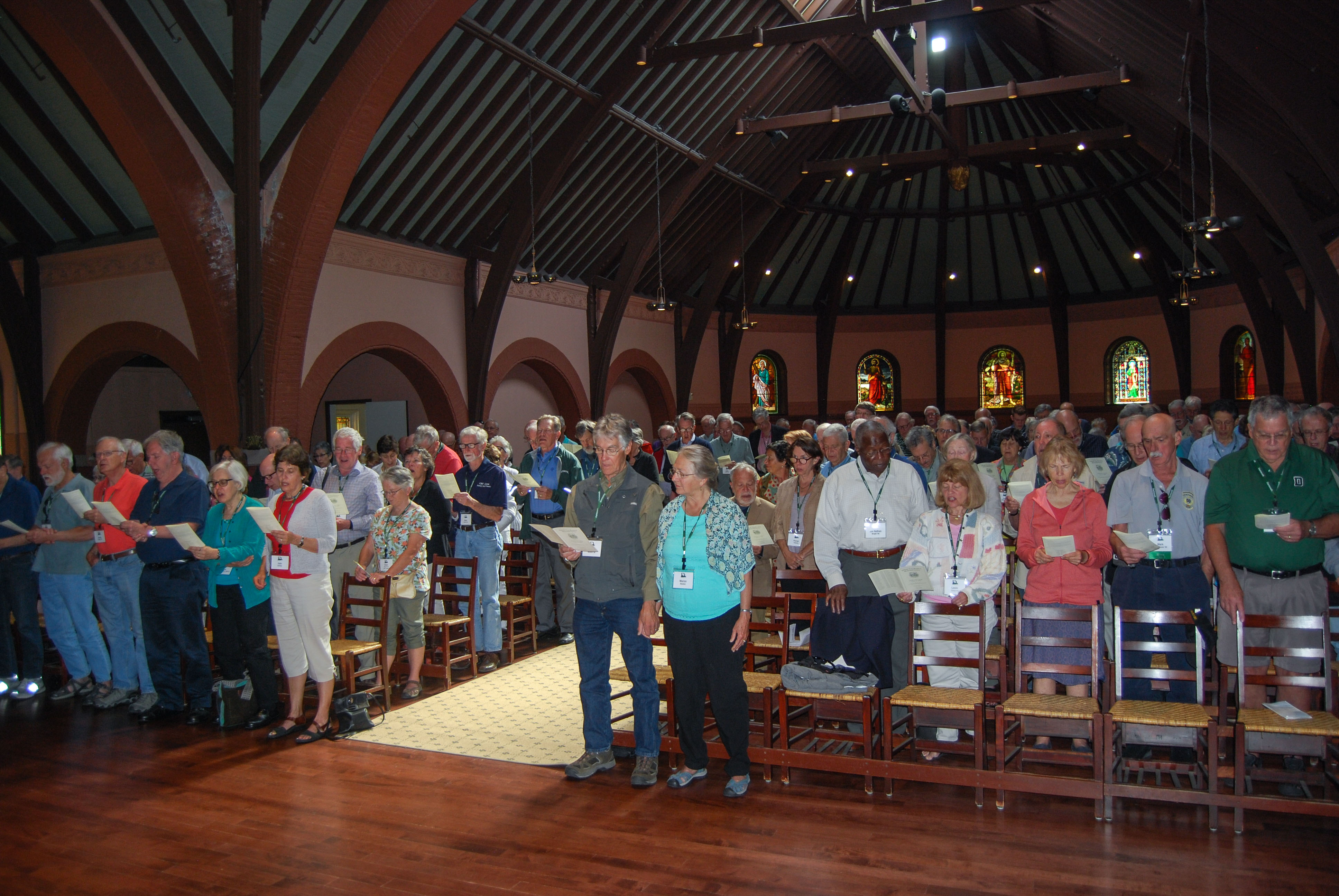
Attitudes Toward Women. In 1968, Dartmouth was still an all-male school. If we wanted dates, we had to drive for hours to women’s colleges such as Smith, Skidmore, or Wellesley. When I was an undergraduate, sex (or the lack thereof) was a frequent topic of conversation. Girls weren’t allowed to stay in our dorm rooms or in fraternity houses. Amorous couples had to find local motels—or carry mattresses to the golf course to sleep together under the stars. But in our junior year, so-called “parietals” (dorm rules governing visits from members of the opposite sex) were dropped, and all bets were off. For better or worse, it was a major turning point in the Sexual Revolution.
As Dorothy Parker famously put it “If all the girls who went to Dartmouth’s Winter Carnival were laid end to end, no one would be surprised.” When groups of women’s college students arrived on buses for big-weekend visits, some guys would line up and raise numerical “scorecards” as the young ladies walked by. The first song I learned as a freshman was the bawdy “Dartmouth’s in town again! Run, girls, run!” Talk about toxic masculinity!
At my reunion, I talked with classmates about how our attitudes toward girls and women in those days affected our subsequent behavior in the decades thereafter. Today’s #MeToo movement has given all of us reason to reflect. We could have treated women with more consideration and respect. We were wrong not to have done so.
Counseling Current Students. At our reunion luncheon in the Connecticut Riverfront Tent, visiting associate professor of writing Jennifer Brooke Sargent gave a speech. (She’s a former law professor at the Vermont Law School.)
Sargent said our class had “really interesting parallels” to the Class of 2018. “What can you, the Class of 1968, do to help today’s students?” she asked us. She described today’s undergraduates as “smart, motivated, and driven” but also “inwardly focused,” partly because of social media.
“They are very anxious,” she said. “They have a lot of mistrust. They don’t trust government, the economy, the media, or other institutions. They ask: ‘What does my future look like? Do my ideas even matter?”
She said the “old answers” of having faith, reaching out, and helping others “seem too idealistic and too false.” Many, she said, “don’t tend, as a group, to have a great social conscience outside of themselves.” She noted that deep divisions exist between wealthy students and those from lower-income backgrounds.
To prepare for her address, she read many of the essays we had posted on our reunion website. “You were all concerned with other human beings,” when you were students, she observed. She urged us to help today’s Dartmouth students “expand their view, expand their vision” and have a broader social conscience.
It wasn’t, however, exactly clear how we are supposed to do that. In some ways, I thought, today’s students can teach us old alums a lot about race, gender, and sexual-orientation diversity.
Changes on Campus. Today there are more female than male students at Dartmouth. I visited my old fraternity. It’s now a sorority. My wife and I were greeted warmly by its sisters, a rich mix of Asian-American, African-American, and Hispanic-American women. The father of one student had come from California to see his Mexican-American daughter graduate. He was cooking tacos for the crowd. My old room had a rainbow flag hanging from the window. Two African-American sisters chatted with us about how much they loved Dartmouth. The college on the hill has indeed changed—and in many ways for the better. But they were still playing “beer pong” in the basement!
Today hard liquor has been banned on the campus, which is probably a good thing. My reunion dinners and the bar at the class tent only served wine and beer. When I was the social chairman of my fraternity, we specialized in potent punches that combined several bottles of hard alcohol masked by various fruit juices that virtually guaranteed rapid intoxication. Yes, we overindulged on occasion, but, hey, those winters were long and cold, especially if you didn’t have a date. But I admit binge drinking was sometimes a serious problem.
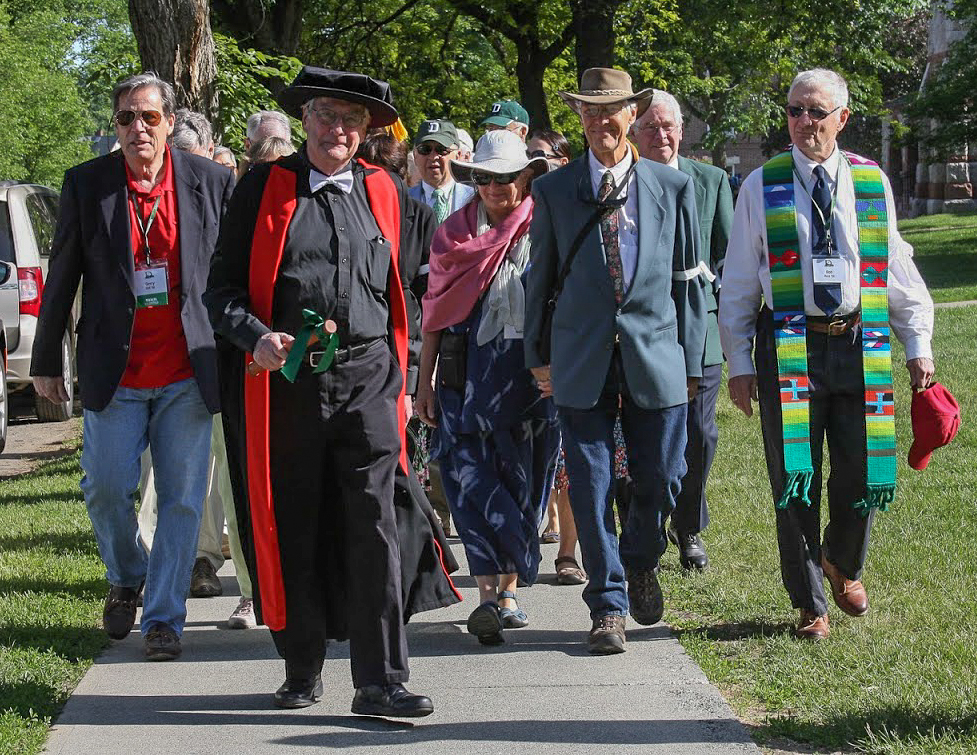
Commencement Ceremony. On June 10, a beautiful sunny day, members of my class gathered in front of Dartmouth Hall and lined up for our class photo. We had been asked to dress nicely, and most of us did. Some wore Dartmouth green blazers or vintage neckties with the old Indian symbol. Then we walked in two lines onto the Green, where several rows of seats had been reserved for us behind the Class of 2018. The speakers were all positive and not political, much to their credit and our relief.
This was a sharp contrast from our raucous commencement. Our keynote speaker was New York’s Republican Senator Jacob Javits. Some classmates booed him and stood and turned their backs to him because he supported the war. When our valedictorian Jamie Newton delivered an anti-war speech, others tried to shout him down. A fair number of parents, many of whom were World War II veterans, walked out. We were probably more divided then than we are today.
At this year’s ceremony, at the urging of one classmate, some of our members and spouses wore white armbands to protest the current administration—and as a nostalgic echo of our commencement ceremony. Many of us, however, chose not to wear the armbands, believing the day’s events should be focused on the current graduates, not aging Baby Boomers.
Giving Back to Communities. At our class meeting, it became clear that many of us actively volunteer in our communities with charities, churches, schools, arts and environmental groups, and other essential organizations of a civil society. The Class of 1968 has many good men who want to help in whatever way we can, although we may disagree on the best strategies. Our determination to “give back” remains strong and has only grown over the last 50 years. We still want to change the world for the better. We agreed to begin telling our stories through our class newsletter and website, not as “virtue signaling” but as a way to share good ideas and encourage more volunteerism and philanthropy.
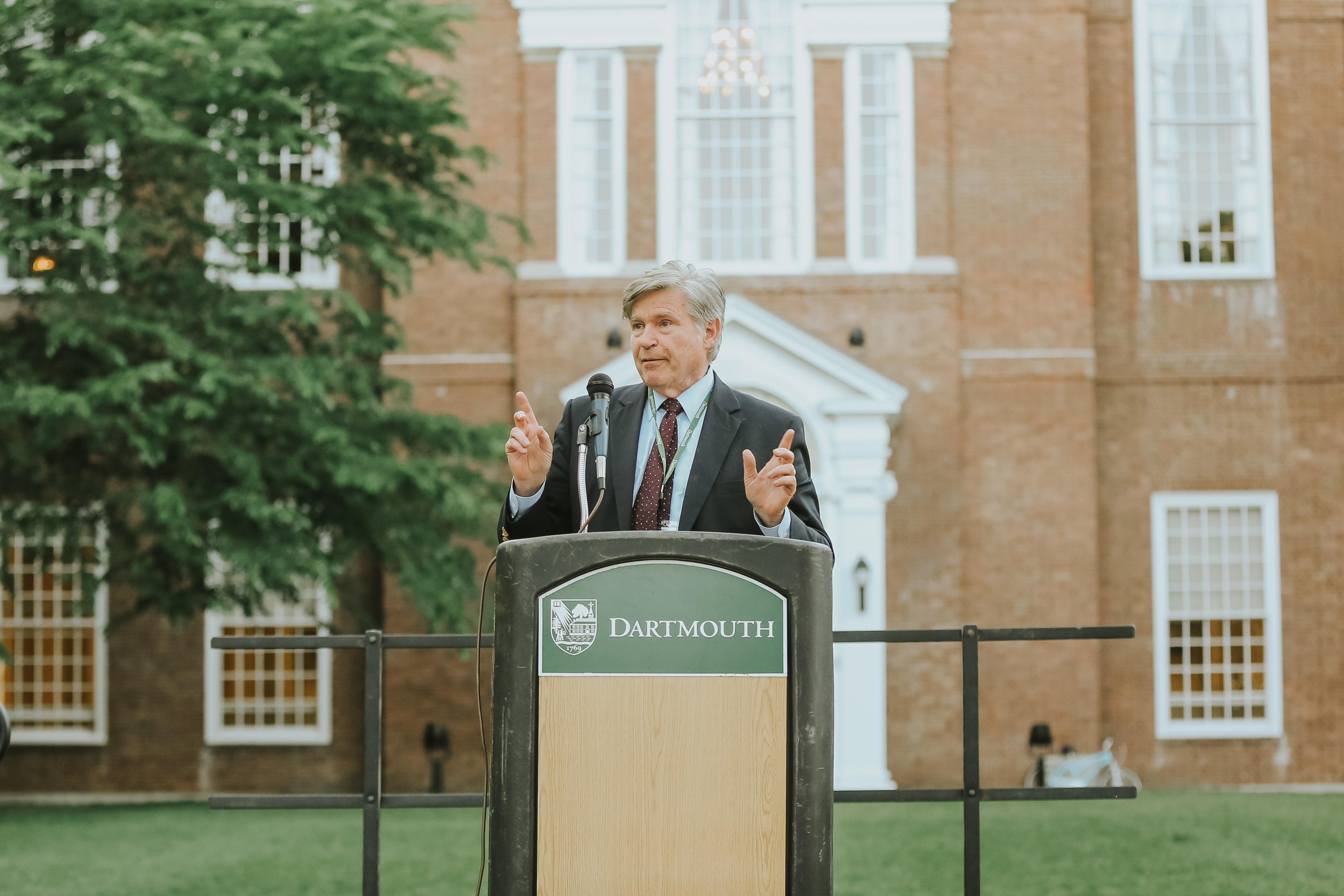
Lessons from Frost. I was an English major, and, to me, one highlight of the reunion was the Friday evening class dinner on the lawn in front of Baker Library. English Professor Donald Pease gave a compelling talk on “The Wit and Wisdom of Robert Frost.” Frost spent time at Dartmouth, then left, but came back “because he understood the true meaning of ‘alma mater’ – a soul mother who cultivates the competency of the soul,” said Pease, who also serves as chair of the Master of Arts in Liberal Studies Program,
He quoted several of Frost’s iconic poems, including “The Road Not Taken.” Its last lines are:
Two roads diverged in a wood, and I—
I took the one less traveled by,
And that has made all the difference.
Pease correctly noted that the poem says the two roads were “really about the same,” suggesting a kind of arbitrariness in life’s choices.
I talked to many classmates who started on one path but ended on another. That happened to me. Because of my car accident, I was not commissioned as an officer in the Navy, as I had expected. Instead, I landed a job at my hometown newspaper and stumbled into a career in journalism. I covered the anti-war movement and later worked in Washington, D.C., during the Watergate years. As I reflected on the tipping points in my life, I realized how our roads in life often depend on quirks of fate that have profound consequences.
Paddling the Connecticut. I was a member of the Ledyard Canoe Club at Dartmouth. When I needed a break, I would go down to the Connecticut River and take out a canoe for a couple of hours. I promised my wife we would go paddling during the reunion. On Sunday afternoon, we rented a two-person kayak. It was a beautiful day, and few others were on the river where I canoed more than 50 years ago. As we lifted our paddles together in the cool water along the tree-lined shore, many good memories flooded back.
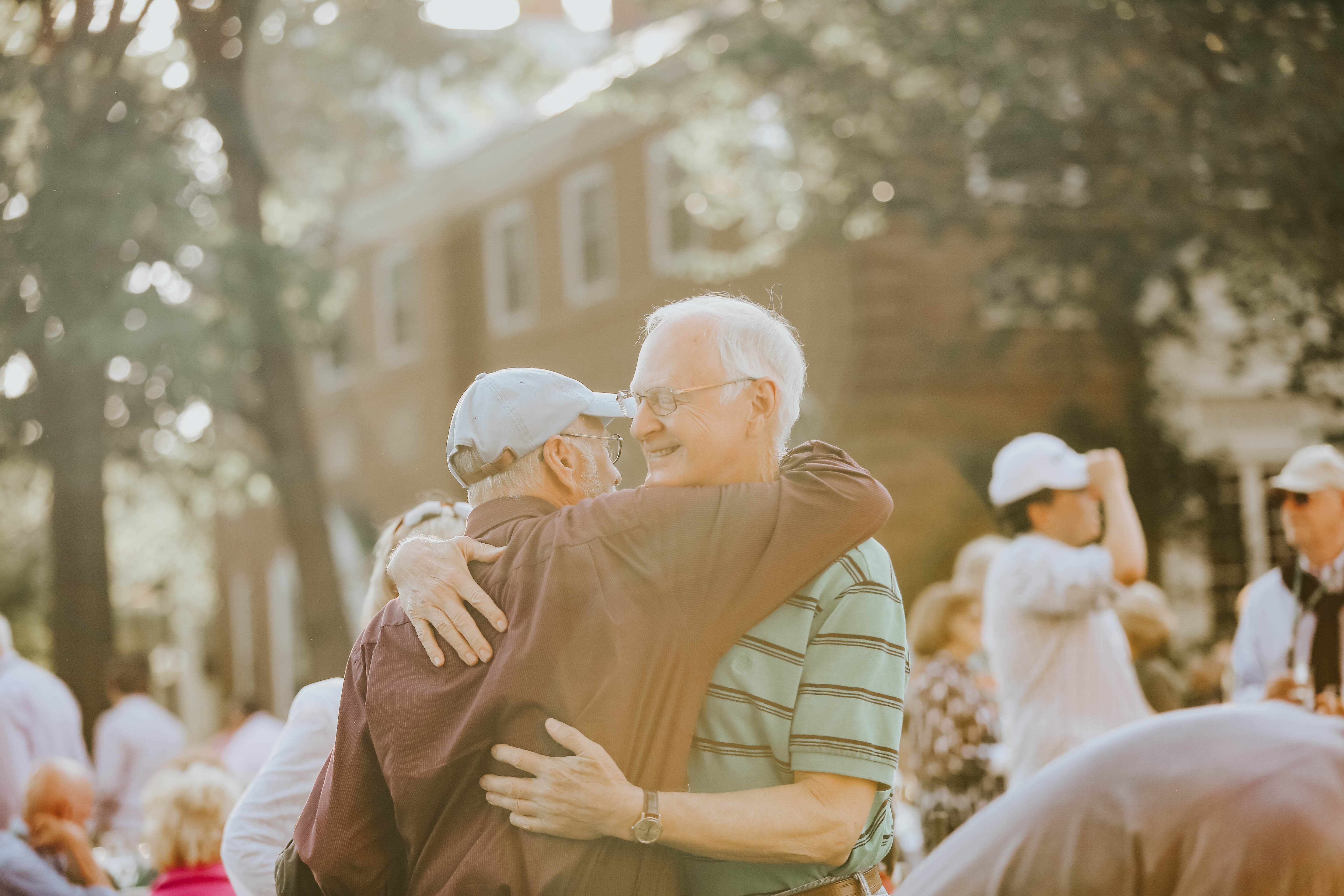
Final Sunday Gathering. On the last weekend evening of the reunion, a classmate hosted a barbecue at his lovely home on the river. At long tables under a large tent, we had hamburgers and hot dogs and continued connecting with friends, old and new. By then we all had discussed careers, travels, retirements, and various health issues, and our conversations had gradually grown deeper.
Classmates talked candidly of divorces, illnesses, addictions, firings, accidents, financial struggles, and all the other vicissitudes that life inevitably offers. We also talked a lot about our children and grandchildren and the joy they bring us. Five decades after our graduation, we all seemed to agree that family and friends matter most in life. We promised to stay in better touch and to come to our 55th reunion. Dartmouth undying indeed.
Yet how can we be silent and remember,
The splendor and the fullness of her days?
John Hamer, a retired journalist, lives on Mercer Island, Washington.
